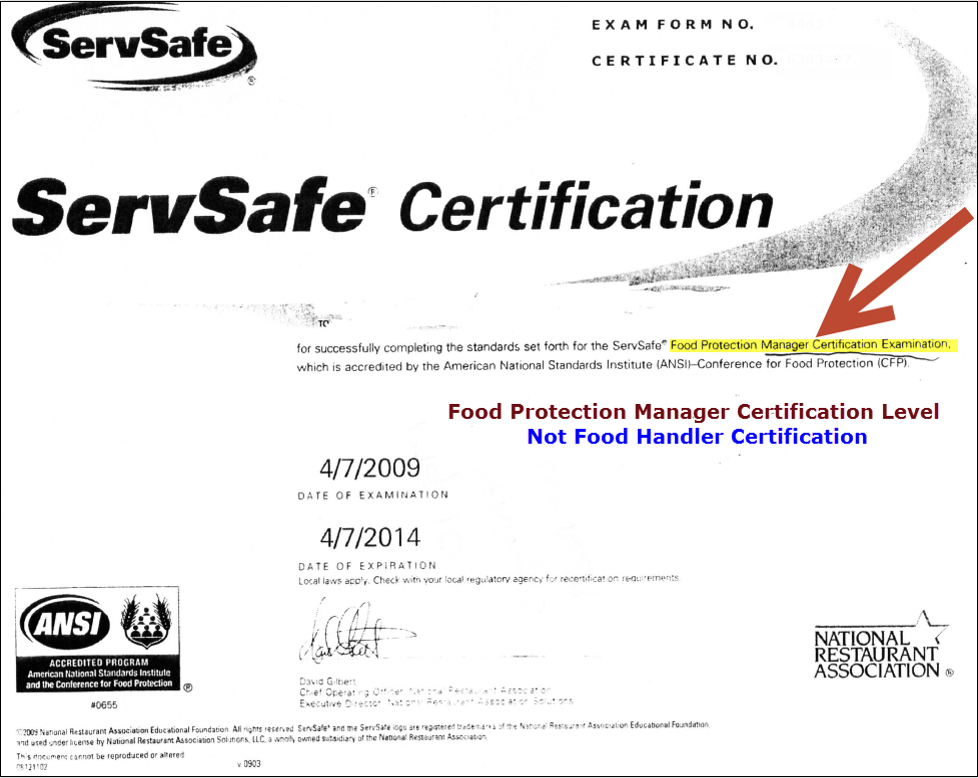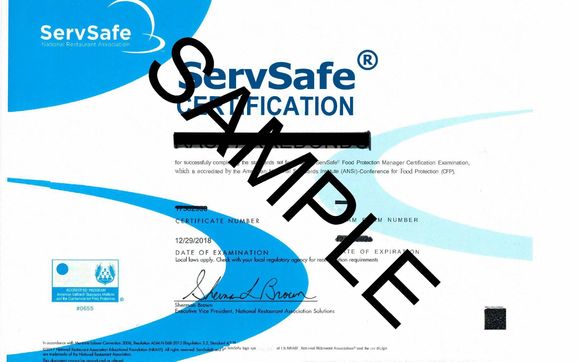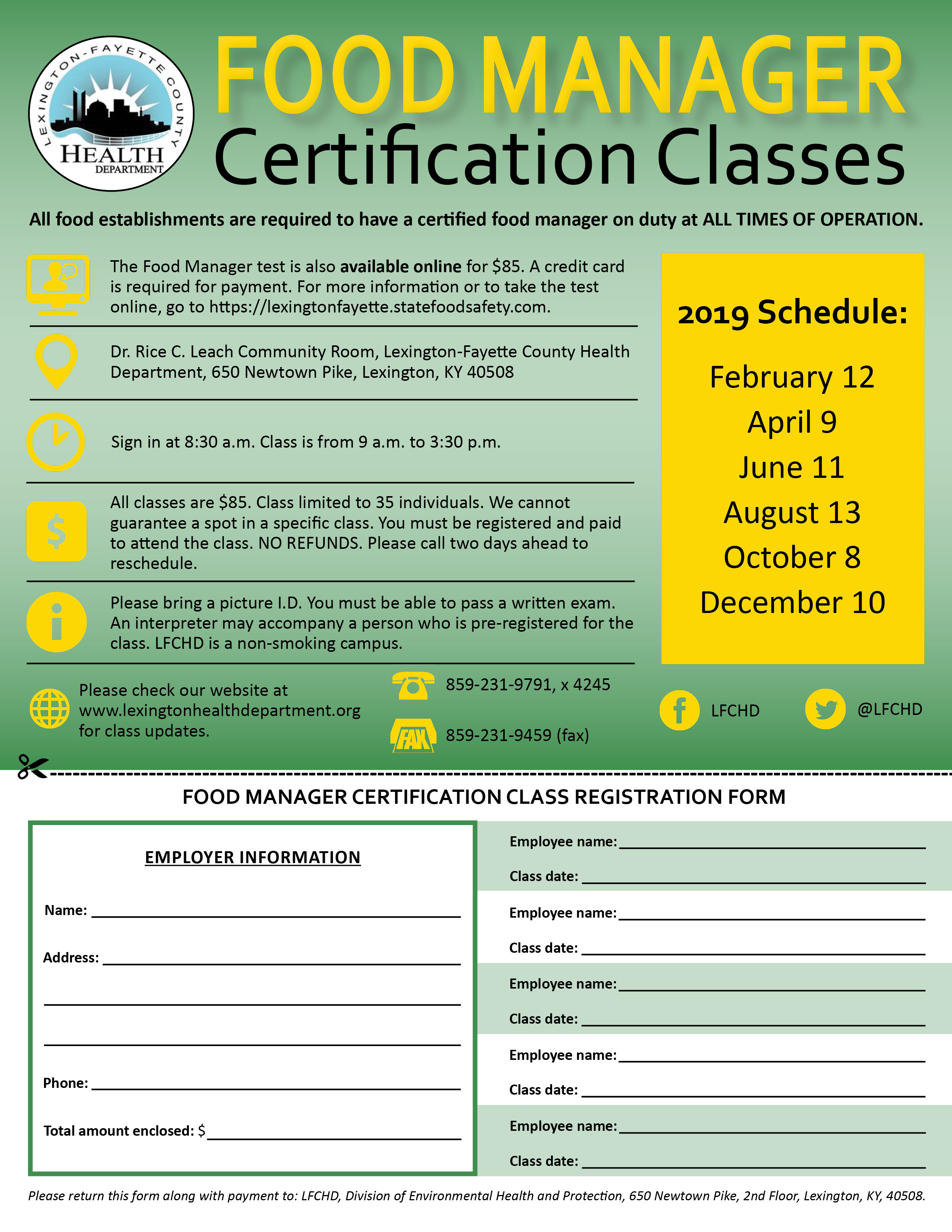Just How ServSafe Manager Certification Enhances Food Security and Compliance
Wiki Article
Specialist Training for Food Manager Qualification Made Simple
The importance of food manager certification can not be downplayed, specifically in an era where food safety is paramount. Expert training programs have evolved to streamline the certification process, providing essential knowledge and practical skills required for reliable food monitoring.Value of Food Manager Qualification
The relevance of Food Supervisor Accreditation can not be overstated in today's food solution market. This qualification indicates that food managers possess the crucial knowledge and skills to make sure food safety and security, keep health and wellness standards, and promote regulative compliance. In an age where foodborne health problems can have serious consequences, the duty of a licensed food manager becomes vital in safeguarding public wellness.Food Manager Certification not just equips people with the know-how to reduce and identify food safety and security risks yet likewise boosts the trustworthiness of the facility. Customers are progressively critical; they seek guarantee that their dining experience is secure and hygienic. Certification offers as a mark of expertise that can attract and preserve customers.
In addition, neighborhood jurisdictions and lots of states mandate that facilities use certified food supervisors to abide with health and wellness laws. This requirement highlights the qualification's importance in preventing possible lawful implications and fines. Furthermore, a qualified food supervisor can lead staff training, fostering a society of safety and responsibility within the work environment. Purchasing Food Supervisor Certification is a financial investment in quality, safety and security, and the overall success of food service operations.
Overview of Expert Training Programs
Expert training programs for food supervisor qualification are made to supply thorough education and learning on food security methods, regulative compliance, and danger administration. These programs aim to gear up food service professionals with the knowledge and abilities essential to make certain secure food handling and prep work in various settings, consisting of dining establishments, catering services, and institutional food procedures.Generally, specialist training programs encompass both theoretical and practical parts, allowing participants to engage with real-world scenarios. The educational program often consists of necessary topics such as foodborne illnesses, correct food storage methods, cleanliness protocols, and staff member training methods. These programs are often updated to line up with the latest market criteria and guidelines, ensuring that individuals obtain present and pertinent details.
Many programs use versatile distribution approaches, including in-person classes, on the internet courses, or a hybrid technique, satisfying various knowing choices and schedules. Upon successful conclusion, individuals usually get certification, which is usually recognized by regional wellness departments and governing agencies, improving their occupation leads within the food service sector. Overall, professional training programs play a critical role in fostering a culture of food security and conformity amongst food managers and staff.
Key Topics Covered in Training
Food safety and security is an important emphasis in food supervisor qualification training, incorporating a variety of important subjects that ensure participants are fully equipped to manage food securely. One of the main subjects covered is the significance of personal hygiene, which includes correct handwashing techniques and the importance of maintaining cleanliness in food preparation locations.In addition, the training addresses foodborne health problems, outlining the numerous microorganisms that can infect food and the symptoms connected with these health problems. Participants find out about the problems that advertise bacterial growth, which is essential for preventing outbreaks.
Temperature level control is an additional crucial topic, stressing the safe food preparation, cooling, and storage temperature levels needed to lessen threats. The training also covers cross-contamination prevention strategies, making sure that raw and prepared foods are dealt with suitably to stay Manager Certification Training clear of harmful communications.
In addition, food safety and security guidelines and standards, such as those stated by the FDA and regional wellness departments, are reviewed to supply a thorough understanding of compliance needs. Reliable pest control procedures are analyzed to secure food facilities from infestations that can jeopardize security. Jointly, these topics lay a strong foundation for risk-free food monitoring practices.
Advantages of Professional Training
Exactly how can experienced training enhance food safety methods within a facility? Specialist training gears up food supervisors with comprehensive knowledge of food security guidelines, market requirements, and finest practices. This foundational understanding is important for preserving a risk-free and clean cooking atmosphere, inevitably lowering the risk of foodborne illnesses.Moreover, expert training fosters a proactive method to food security by emphasizing safety nets and hazard evaluation. Supervisors trained by market experts can efficiently identify potential threats and apply approaches to minimize them. This not just shields customers but also enhances the facility's online reputation and reliability.
Furthermore, expert training urges a society of constant enhancement. Food managers who participate in ongoing education and learning are much better prepared to adapt to new policies and trends in the food solution market. This adaptability can bring about enhanced operational efficiency and price savings.


Steps to Accomplish Qualification
Achieving certification in food administration calls for a systematic method that includes numerous vital steps. Individuals must select an accredited training program that offers extensive coursework in food security, sanitation, and management concepts - ServSafe Food Manager Certification. These programs frequently offer valuable sources, including research study materials and technique examinationsNext, prospects must actively take part in the training sessions, whether online or in-person, to improve their understanding of vital subjects such as foodborne illnesses, personal hygiene, and correct food storage techniques. Involvement in discussions and functional workouts can additionally enhance understanding.

Once appropriately ready, candidates can arrange and take the exam. Successful completion typically requires achieving a particular passing score, which demonstrates a detailed grasp of food security requirements.
Conclusion
In summary, expert training for food supervisor qualification plays an important function in making certain food security and compliance with regulative requirements. The organized programs offer crucial understanding and functional skills essential for handling foodborne ailments and cleanliness methods efficiently. By helping with access and enhancing career potential customers, these training efforts contribute significantly to public wellness. Eventually, attaining food supervisor certification via professional training not just raises specific expertises yet additionally fosters a safer food environment for all.
Expert training furnishes food supervisors with extensive expertise of food security laws, market standards, and finest practices.In recap, professional training for food manager accreditation plays a vital duty in making sure food safety and security and compliance with regulative criteria (ServSafe Manager). Ultimately, accomplishing food manager qualification via specialist training not only elevates individual competencies but additionally fosters a much safer food atmosphere for all
Report this wiki page